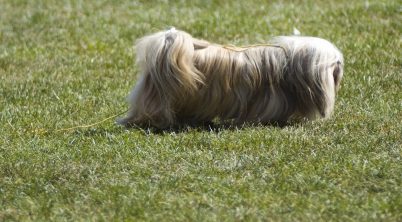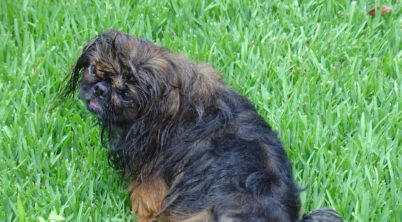Many Pekingese dogs suffer from sensitive stomachs, which can affect their health and happiness. Proper nutrition is essential for these small yet spirited pets. Choosing dog food formulated for sensitive stomachs can ease digestive issues and improve overall well-being.
A balanced diet tailored to a Pekingese’s specific needs can reduce stomach problems. Foods with easily digestible ingredients like barley and brown rice are often recommended. These ingredients help support digestion while providing essential nutrients. It’s also crucial to avoid foods with soy, wheat, or artificial additives, as these can trigger sensitivities.
Owners should always follow feeding guidelines and adjust portions based on their dog’s age, size, and activity level. Pekingese dogs typically need about 1/2 to 1 cup of dry food per day, divided into two meals. Regular monitoring and adjustments can help maintain their health and vitality.
Table of Contents
Understanding the Pekingese Breed
The Pekingese is a unique toy breed known for its noble appearance, distinctive coat, and specific health issues. They have a fascinating history and unique characteristics.
History and Characteristics
The Pekingese originated in ancient China and were bred to live among royalty. This breed is small, usually weighing less than 9 pounds. They are easily recognized by their lion-like mane, which is a thick fur around their neck and shoulders.
Pekingese dogs have a characteristic flat face with a short snout and large, expressive eyes. Their body is low and stocky, with slightly bowed limbs. The American Kennel Club (AKC) first recognized the Pekingese in 1906.
Common Health Issues
Pekingese dogs are prone to several health problems due to their physical characteristics. They often struggle with breathing issues because of their flat faces, which is known as brachycephalic syndrome. Additionally, their large eyes can be prone to injuries and infections.
This breed also has a tendency towards obesity, which can exacerbate other health problems. Their long fur can lead to skin issues if not properly groomed. It’s essential for Pekingese owners to be vigilant about these common issues and seek regular veterinary care.
Essentials of Pekingese Nutrition
Pekingese have specific dietary needs that vary based on age and help maintain their health. A balanced diet rich in protein, vitamins, and other nutrients is crucial.
Nutritional Needs by Age
Puppies: Pekingese puppies require a diet high in protein to support growth. They should eat food with at least 22% protein. Small and frequent meals are best to keep their energy levels stable.
Adults: Adult Pekingese should have a diet with 18% protein. They need meals rich in healthy fats, such as omega-3 and omega-6 fatty acids, to keep their skin and coat healthy. Carbohydrates provide the necessary energy for daily activities.
Seniors: Older Pekingese may need fewer calories but more fiber to aid in digestion. Senior dog food formulas often contain glucosamine to support joint health.
The Role of a Balanced Diet in Health
A balanced diet for a Pekingese includes proteins, fats, carbohydrates, vitamins, and minerals. Proteins maintain muscle mass and overall body function. Fats, especially essential fatty acids, promote healthy skin and coat.
Carbohydrates supply energy. Good sources include brown rice and sweet potatoes. Vitamins and minerals are vital for immune function, bone health, and overall wellness.
Fiber helps with digestion and prevents constipation. Including a mix of soluble and insoluble fiber, found in vegetables and grains, ensures smooth digestion.
Feeding high-quality dog food tailored to the Pekingese’s specific needs at each life stage is essential for maintaining their overall health and preventing common health issues.
Identifying a Sensitive Stomach in Pekingese
Identifying if a Pekingese has a sensitive stomach involves observing several symptoms and knowing when professional help is needed. It’s crucial to notice signs like digestive problems and abnormal behaviors.
Symptoms of Digestive Discomfort
Pekingese may show a range of symptoms if they have a sensitive stomach. Common signs include vomiting, diarrhea, or both. Another indication is a change in appetite or drinking habits.
If a Pekingese repeatedly licks the air or has foam around the mouth, these can be signs of digestive discomfort. Additionally, excessive flatulence or grumbling noises from the stomach might also point to sensitivities.
Skin problems such as itching or rashes can accompany digestive symptoms, indicating that food allergies might be involved. Recognizing these symptoms early can help in managing the condition more effectively.
When to Consult a Veterinarian
If symptoms of a sensitive stomach persist for more than a day or worsen, it’s essential to consult a veterinarian. Persistent vomiting or diarrhea can lead to dehydration and other serious health issues.
If the Pekingese shows signs like lethargy, weight loss, or a bloated abdomen, immediate professional advice is necessary. A veterinarian can run tests to pinpoint allergies or other underlying conditions.
They can also recommend a diet change or prescribe medication. Always consult a professional rather than attempting to diagnose or treat health issues at home. Regular check-ups can help manage sensitivities effectively.
Choosing the Best Dog Food for Pekingese with Sensitive Stomachs
Selecting the right dog food for a Pekingese with a sensitive stomach involves identifying suitable ingredients and avoiding harmful ones. Trusted brands with high-quality products are key.
Ingredients to Look For
Opt for real meat like chicken, turkey, or lamb as the primary ingredient. These proteins are easier to digest and provide essential nutrients.
Digestible carbohydrates like sweet potatoes and brown rice help with digestion, giving the dog energy without upsetting the stomach.
Healthy fats, including omega-3 fatty acids from fish oil, support coat health and reduce inflammation. Antioxidants from fruits and vegetables also boost the immune system.
Ingredients to Avoid
Stay away from artificial additives, which can irritate the stomach. This includes colors, flavors, and preservatives.
Avoid common allergens like corn, wheat, and soy. These are often linked to digestive issues and can cause allergic reactions.
Low-quality fillers such as by-products and unspecified meat meals should also be excluded. They provide little nutritional value and might trigger stomach problems.
Recommended Brands and Products
Blue Buffalo offers high-quality, sensitive stomach formulas that many dog owners trust. Their limited ingredient diets (LID) are particularly effective.
Spot and Tango creates fresh, grain-free options that cater to dogs with digestive issues. Their recipes focus on real meat and simple ingredients.
Whole Earth Farms Grain-Free is another top choice, featuring lean meat-based proteins and a balanced nutritional profile.
For those considering raw diets, We Feed Raw Turkey Patties is a solid option, emphasizing natural ingredients free from fillers and additives.
Special Considerations for Feeding Pekingese
Feeding a Pekingese requires special attention due to their size and health needs. Proper portion control and knowledge of potential allergies can help ensure they remain healthy.
Portion Control and Weight Management
Maintaining a healthy weight is vital for a Pekingese. Obesity can lead to various health problems, such as joint issues and heart disease. Adult Pekingese often need around 1/2 to 1 cup of dry food daily, divided into two meals.
It’s crucial to measure food portions accurately. Monitoring their weight regularly can help adjust portions as needed. Limiting table scraps and treats can also prevent overfeeding. Keep treats under 10% of their daily caloric intake. Owners should consider their dog’s activity level and consult a vet for specific nutritional needs or adjustments.
Dealing with Food Allergies and Intolerances
Some Pekingese may suffer from food allergies or intolerances. Common signs include itching, digestive problems, or skin irritation. Identifying and eliminating specific allergens from their diet can alleviate these problems.
Choosing a diet with limited ingredients or hypoallergenic formulas might help. Foods free from common allergens, like beef or dairy, are recommended. The diet should also meet AAFCO nutritional requirements to provide balanced nutrition. If symptoms persist, it’s wise to seek veterinary consultation to tailor the diet to the Pekingese’s specific dietary needs.








